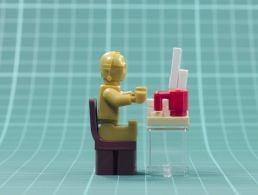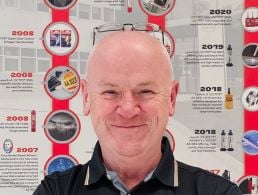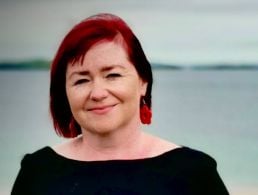To coincide with the release of the Ghostbusters reboot – featuring, for the first time, an all-female team of scientists and paranormal investigators – we’re talking to the real-life female scientists and researchers at work in Ireland.
Dr Roisin Kyne, a postdoctoral fellow at the Irish Centre for Research in Applied Geoscience (iCRAG), tells us about her work in geology, and why it’s important for the STEM sector to change its image.
What drew you to this research area?
The chance to work with my hands and explore the big-picture questions about the Earth. I loved the idea that I could get out into the wilderness while doing research and teach others about the world around them.
What’s the best thing about working in geoscience?
I really love the diversity that goes along with a career in geoscience. I get to visit remote and unique locations all around the world to conduct science. I get to look at interesting and intriguing rocks, and I get to use those rocks to tell incredible stories about how the Earth formed.
What’s the most exciting development you’ve witnessed in your sector since you started working in it?
The change in perspective regarding women in geology. When I graduated with my undergraduate degree, I was the only woman in my graduating class. Now, the industry and academic sectors are starting to value the presence of a diverse workforce. Inclusivity and acceptance have come a long way for women in mining.
While there is still a lot to be done, I think that the geosciences are heading in the right direction.
What aspect of your job have you struggled to get to grips with?
The fast-paced, competitive field of academics. It can be a very difficult and rejection-filled career, where you are constantly competing for funding and research opportunities. It requires that you have a positive outlook no matter what, and that you can pick yourself up and keep moving.
What’s been the hardest thing you’ve had to face in your career?
The hardest thing for me to face in my career is a fear of failure.
Having a research career in the STEM sector means you are working with very bright and innovative people and you are producing new, state-of-the-art research. This means that you never really know if your research will be successful until you’ve done it.
The fear of failure can be great, and the fear that you will not succeed in a field full of other bright researchers can be debilitating. The trick is to surround yourself with supportive people and to learn to value your own skills and expertise.
The first time that my research didn’t quite work out provided huge learning insights. I think that it was a great experience, which taught me that failure is not all that bad, and that you actually learn more from your failures than you do from your successes. Failure teaches you how to be a better researcher and how to turn that failure into something positive.
A fear becomes far less potent once you have faced it and moved on.
If you had the power to change anything within the STEM sector, what would that be?
What I would change is the stigma surrounding STEM.
STEM is seen as a male-dominated, extremely difficult field that is oftentimes represented by ‘nerdy’ characters like Sheldon from The Big Bang Theory. STEM is, in fact, a vastly diverse field, allowing people of all walks of life to come together over a common goal: curiosity.
People who work in STEM are looking to help change the world through knowledge, technology, innovation and understanding. The most important thing is that we are all curious, questioning people, and you don’t have to be a rocket scientist – although it’s perfectly great if you are – in order to ask questions and seek answers.
Which of your personality traits makes you best suited to your job and this sector?
The number one most important personality trait that makes me best suited to my job as a researcher in geoscience is my curiosity and the genuine need and want to understand how the world formed.
Is there something in your personal life that helps you in your job?
I have an incredible support system who act as my personal cheerleading team. When I am frustrated, they are there to help remind me why I do what I do, and that I am succeeding at doing it.
The other important thing is that I am involved in other activities – ie, sports teams – and I have other interests outside of STEM. These help me explore all the facets of my personality and keep me from getting too far stuck into my research.
How do you make connections with others in the STEM community?
There are many ways to connect with the STEM community.
For myself, there are always great opportunities through the university I work with to meet other scientists from all aspects of STEM, whether it is through structured STEM-related activities – conferences, research presentation events, etc – or through social activities, like organised movie nights or paper aeroplane competitions.
There are also a variety of online websites and email services that connect STEM researchers from around the world. Websites like Research Gate allow individuals to highlight their research and easily contact others whose research they might be interested in.
Email platforms also allow mass emails to be sent to those subscribed to those lists and help keep us all connected.
Has mentorship or coaching been important in your career?
Absolutely! At each stage of my career I have had the opportunity to work with a variety of different mentors to whom I still go for advice and help to this day. I would never have even entered a STEM-related degree without the coaching and guidance of a professor in the field.
I think that it is crucial for young scientists to have help and guidance in order to shape their career paths in a way that is exciting and will lead to success.
What advice would you give to someone thinking about a career in this area?
Go for it! A career in STEM is a unique, interesting and important choice that will allow you to explore your interests and your questions in a manner that is useful and important to the wider population. You will get to shape your career in ways you can’t yet imagine.
By getting involved in geology specifically, you get to be both scientist and storyteller. You will look at the world around you in a new light, and you will find interesting and unique stories in everything you see. Not only will you be helping to understand the Earth and how it formed, you will also be providing natural resources to the world.
What better way to spend your time than to travel the world, meeting interesting and new people while being paid to play outdoors?
Looking for jobs in tech or science? Check out our Featured Employers section for information on companies hiring right now.




